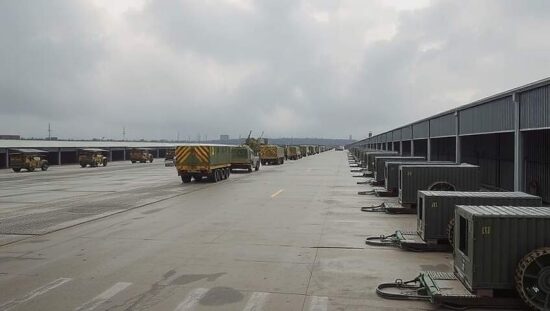A confidential report from the Federal Office for Procurement (BAFA) has cast a shadow over Germany’s ambitious plan to equip a Lithuanian-based rapid reaction brigade with advanced loitering munition drones, widely nicknamed “kamikaze drones” raising serious concerns about delivery timelines and operational readiness. The BAFA now assesses the supply of these drones as “endangered” before the planned initial operational capability in early 2027.
The procurement program, valued at €942 million and targeting the acquisition of up to 12,000 medium-range drones, is facing significant hurdles across all three primary suppliers. The report, leaked to “Der Spiegel”, details how the anticipated “great risks” associated with a rapid series deployment largely materialized, presenting a stark contrast to initial optimistic projections.
Testing and preliminary contract negotiations for the drones produced by Stark (Virtus) and Helsing (HX-2) have been underway since April. Both companies are reportedly “delayed” in delivering their systems. Field trials conducted in October further exposed “technical challenges and deficits” previously acknowledged by the vendors themselves, raising doubts amongst military planners.
Specific performance issues have been identified with the Stark drone, while Helsing’s recently announced switch of warhead manufacturers just prior to contract negotiations necessitates additional technical clarification. The Rheinmetall drone, “Raider” is described as being in a developmental stage comparable to a prototype, significantly behind schedule for integration into the broader procurement plan.
While the Ministry of Defence maintains that it remains “in close consultation” with the companies and currently deems the Lithuanian brigade’s equipment not “endangered” the BAFA report highlights a concerning pattern of delayed deliveries, technical shortcomings and ongoing uncertainties. Critics argue that the rush to adopt cutting-edge drone technology, driven by heightened geopolitical tensions and the ongoing war in Ukraine, may have compromised thorough due diligence and risk assessment.
The situation raises questions about Germany’s commitment to bolstering NATO’s eastern flank and the viability of relying on nascent drone manufacturers to execute a program of this scale and strategic importance. The incident is likely to fuel debates within the Bundestag regarding the effectiveness of procurement processes and the necessity for greater oversight of high-value military contracts.





